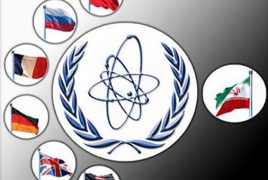Iran, major world powers reach nuclear deal July 14, 2015 - 14:37 AMT PanARMENIAN.Net - Iran and six major world powers reached a nuclear deal on Tuesday, July 14, capping more than a decade of negotiations with an agreement that could transform the Middle East, and which Israel called an "historic surrender", Reuters reports. Under the deal, sanctions imposed by the United States, European Union and United Nations would be lifted in return for Iran agreeing long-term curbs on a nuclear program that the West has suspected was aimed at creating a nuclear bomb. "All the hard work has paid off and we sealed a deal. God bless our people," an Iranian diplomat told Reuters on condition of anonymity ahead of the official announcement. Israeli Prime Minister Benjamin Netanyahu called the deal "a bad mistake of historic proportions". "Iran will get a jackpot, a cash bonanza of hundreds of billions of dollars, which will enable it to continue to pursue its aggression and terror in the region and in the world," he said. "Iran is going to receive a sure path to nuclear weapons." Israeli Deputy Foreign Minister Tzipi Hotovely called the deal an "historic surrender". She said on Twitter that Israel would "act with all means to try and stop the agreement being ratified", a clear threat to try to use its influence to block it in the Republican-controlled U.S. Congress, according to Reuters. The U.S. Congress has 60 days to review the deal, and if it votes to disapprove of it, President Barack Obama can veto the rejection. It would require two thirds of lawmakers to override such a veto, which means some of Obama's fellow Democrats would have to rebel against one of the signature achievements of their president in order to kill the deal. Final talks in Vienna involved nearly three weeks of talks between U.S. Secretary of State John Kerry and Iran's Foreign Minister Mohammad Javad Zarif, unprecedented between countries that have been enemies since Iranian revolutionaries stormed the U.S. embassy in Tehran in 1979 and took 52 Americans hostage. Western diplomats said under the final agreement, Iran had accepted a "snapback" mechanism, under which some sanctions could be reinstated in 65 days if it violated the deal. A U.N. weapons embargo would remain in place for five years and a ban on buying missile technology would remain for eight years. Alongside the deal, the United Nations nuclear watchdog, the International Atomic Energy Agency, announced an agreement with Iran on a roadmap to resolve its own outstanding issues with Tehran by the end of this year. The main deal with the world powers depends on the IAEA being able to inspect Iranian nuclear sites and on Iran answering the watchdog's questions about possible military aims of previous research. Authorities said a total of 192 Azerbaijani troops were killed and 511 were wounded during Azerbaijan’s offensive. In 2023, the Azerbaijani government will increase the country’s defense budget by more than 1.1 billion manats ($650 million). The bill, published on Monday, is designed to "eliminate the shortcomings of an unreasonably broad interpretation of the key concept of "compatriot". The earthquake caused a temporary blackout, damaged many buildings and closed a number of rural roads. Partner news |